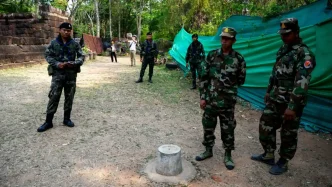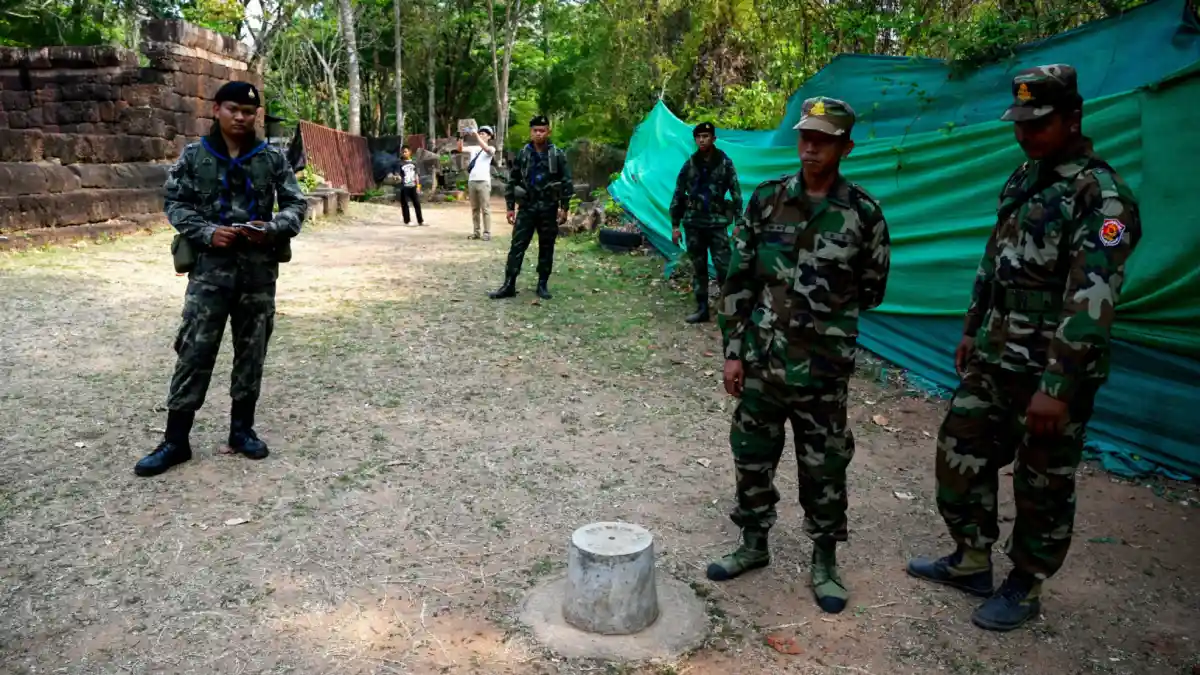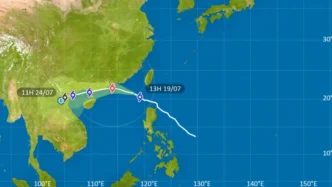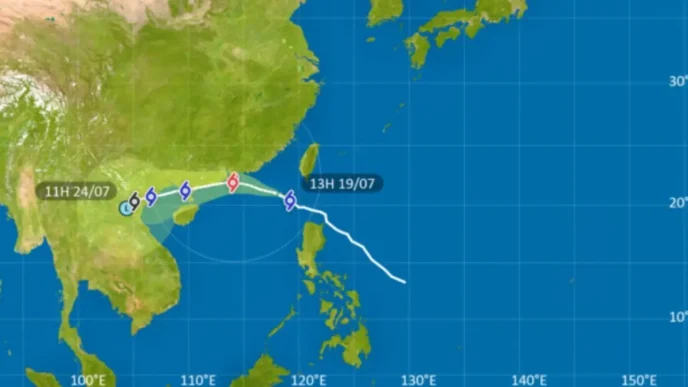Thailand has issued a stern condemnation of Cambodia, accusing its neighbor of planting anti-personnel landmines along their shared border, an act described as a grave violation of international law and Thai sovereignty. The accusation follows a devastating explosion on July 16 near the Chong Bok border area in Thailand’s Ubon Ratchathani province, which left three Thai soldiers injured, one with permanent disabilities.
Explosion Sparks Diplomatic Tensions
The incident has reignited long-standing tensions between Thailand and Cambodia over their disputed border regions, a historically contentious area marked by past conflicts and unresolved territorial claims. According to Thai officials, the blast occurred in a border zone that has been a focal point for security patrols. The Thai Ministry of Foreign Affairs, through spokesman Nikorndej Balankura, released a statement on July 20, denouncing the use of landmines as a direct affront to Thailand’s territorial integrity.
“The Thai government condemns in the strongest terms the use of anti-personnel landmines. Such actions violate Thailand’s sovereignty and territorial integrity and are in direct contravention of the fundamental principles of international law as stated in the United Nations Charter” Nikorndej stated on July 20.
Thai security agencies, as cited by the Foreign Ministry, confirmed through inspections that the landmines responsible for the explosion were recently planted and did not belong to Thailand’s military inventory. Evidence from the blast site, combined with environmental analysis, led officials to point the finger at Cambodian actors, though no specific individuals or groups were named in the public statements.
Violation of International Treaties
The allegations carry significant weight under international law, particularly as both Thailand and Cambodia are signatories to the Anti-Personnel Mine Ban Convention, commonly known as the Ottawa Convention. This treaty, enacted in 1997, prohibits the use, stockpiling, production, and transfer of anti-personnel mines, while mandating the clearance of existing minefields within a stipulated timeframe. Thai officials assert that the incident represents a clear breach of Cambodia’s obligations under this agreement.
The Thailand Mines Action Centre (TMAC), an organization dedicated to demining efforts, echoed the government’s stance in a separate statement. TMAC condemned the act as a severe violation of the Ottawa Convention and highlighted the deliberate nature of the minefield near Chong Bok, which they described as posing a significant threat to both security personnel and civilians in the area.
“It is also a matter of joint responsibility under the Ottawa Convention to support peace, human security, and reduce the indiscriminate threat posed by landmines” TMAC noted in their statement on July 20.
TMAC further called for Cambodia to take concrete responsibility for the incident, urging a transparent investigation, legal action against those responsible, and immediate steps to prevent future occurrences. The center also accused Cambodian authorities of obstructing Thai demining efforts along the border, a claim that adds another layer of complexity to the already strained bilateral relationship.
Human Cost and Regional Implications
Beyond the diplomatic fallout, the human toll of the July 16 explosion has brought renewed attention to the dangers faced by soldiers and civilians in border areas. Of the three Thai soldiers injured, one has sustained life-altering injuries resulting in permanent disability, according to TMAC. The incident serves as a grim reminder of the lingering threats posed by landmines, which have historically plagued the Thai-Cambodian border due to decades of conflict, including the Cambodian Civil War and subsequent border skirmishes.
The broader implications of this event extend to regional stability in Southeast Asia, where border disputes have often tested the diplomatic resolve of neighboring states. Thailand and Cambodia have a history of friction over territories near the Preah Vihear Temple, a UNESCO World Heritage site, which was the site of deadly clashes as recently as 2011. While both nations have since sought to improve relations through bilateral mechanisms, incidents like the recent explosion threaten to derail progress.
Diplomatic Efforts and Public Messaging
In response to the incident, Thailand has initiated diplomatic channels to address the issue. On July 20, the secretariat of the Ad Hoc Centre for the Thailand-Cambodia Border Situation convened to prepare for a high-level meeting scheduled for the following day. Nikorndej emphasized the importance of handling the matter with caution, given the multiple legal and diplomatic frameworks at play.
“This is a sensitive moment. Public messaging, especially on social media, must be responsible to avoid misunderstandings or unintentional divisions” he said on July 20, urging the public to trust government and security officials during this period of heightened tension.
Thailand has also called on Cambodia to cooperate in mine clearance operations along the border, referencing prior agreements between the two countries’ prime ministers. Such cooperation, Thai officials argue, is essential not only for ensuring safety but also for rebuilding trust among border communities who live under the constant shadow of such threats.
Challenges of Mine Clearance and Accountability
The issue of landmines along the Thai-Cambodian border is not new, but it remains a persistent challenge due to the sheer scale of contamination and the political sensitivities involved. Both countries have made commitments under the Ottawa Convention to clear minefields within their territories, yet progress has been uneven. TMAC’s accusation that Cambodia is obstructing Thai demining efforts points to deeper issues of coordination and mutual trust, which are critical for effective humanitarian mine action.
Accountability remains a central concern in the aftermath of the Chong Bok incident. TMAC’s demand for a full investigation and legal action underscores the need for transparency in determining who planted the mines and under what authority. Without clear answers, the risk of further escalation looms large, as does the potential for similar incidents to recur in other contested border zones.
International and Regional Context
The use of anti-personnel mines, if confirmed, would not only violate bilateral agreements and international treaties but also undermine broader efforts to eliminate such weapons globally. The Ottawa Convention has been hailed as a landmark achievement in humanitarian disarmament, with 164 state parties as of recent counts. However, compliance remains a challenge in regions with ongoing or historical conflicts, where mines continue to maim and kill long after hostilities have ceased.
In the context of Southeast Asia, the Thai-Cambodian border incident highlights the fragility of peace in areas burdened by historical grievances and territorial disputes. The Association of Southeast Asian Nations (ASEAN), of which both Thailand and Cambodia are members, has often emphasized dialogue and non-interference as guiding principles. Yet, incidents like this test the bloc’s ability to mediate effectively and prevent bilateral issues from spiraling into wider regional instability.
Looking Ahead: A Path to Resolution?
As Thailand and Cambodia navigate the fallout from the July 16 explosion, the path forward remains uncertain. The high-level meeting on July 21 offers a critical opportunity for dialogue, but success will depend on both sides’ willingness to prioritize cooperation over confrontation. For Thailand, ensuring the safety of its soldiers and citizens along the border is paramount, while Cambodia faces pressure to address the allegations transparently and uphold its international commitments.
Meanwhile, the incident serves as a stark reminder of the enduring threat posed by landmines in the region. Humanitarian mine clearance, supported by international partners and guided by treaties like the Ottawa Convention, must remain a priority for both nations. Beyond the immediate diplomatic crisis, the safety and trust of border communities hang in the balance, as does the fragile peace between two neighbors with a shared but often turbulent history.
As discussions unfold, the international community will be watching closely, hopeful that this incident can be resolved through dialogue rather than further escalation. For now, the border near Chong Bok remains a flashpoint, its silent minefields a testament to the challenges of securing lasting peace in a region marked by history’s unresolved scars.
















